
Economic Theory Bulletin
Scope & Guideline
Exploring the frontiers of economic thought and application.
Introduction
Aims and Scopes
- Mathematical Economics:
The journal emphasizes the application of mathematical techniques to solve economic problems, focusing on formal proofs and theoretical developments. - Game Theory:
A significant portion of the research involves game-theoretical approaches to understanding strategic interactions among agents, including equilibrium concepts and mechanisms. - Market Dynamics and Equilibrium Analysis:
The journal explores various types of market equilibria, including Walrasian and non-Walrasian frameworks, often under conditions of incomplete information or asymmetries. - Behavioral Economics:
Research on how psychological factors influence economic decision-making is a core area, integrating behavioral insights with traditional economic models. - Public Economics and Welfare Analysis:
The journal also investigates issues related to public goods, taxation, and welfare economics, focusing on how policies affect resource allocation and social welfare. - Network Economics:
Emerging research on the role of networks in economic interactions, including the impact of information flows and social connections on economic outcomes.
Trending and Emerging
- Stochastic and Dynamic Models:
A growing number of papers are focusing on stochastic processes and dynamic modeling, reflecting the complexity of real-world economic systems and the need for robust analytical tools. - Behavioral Game Theory:
Research integrating behavioral aspects into game theory is on the rise, indicating a shift towards understanding how cognitive biases and social factors influence strategic decision-making. - Environmental Economics and Policy:
Emerging themes related to environmental issues, such as pollution and resource management, are increasingly prevalent, showcasing the journal's commitment to addressing global challenges through economic analysis. - Network Theory Applications:
The application of network theory to economic interactions is gaining traction, with research exploring how interconnectedness affects economic outcomes and agent behavior. - Inequality and Redistribution:
There is a noticeable increase in studies examining wealth and income inequality, reflecting growing societal interest in the implications of economic disparities and potential policy responses.
Declining or Waning
- Traditional Microeconomic Theory:
Research focusing solely on classical microeconomic models without integrating behavioral insights or contemporary applications has become less prominent, reflecting a broader trend toward more interdisciplinary approaches. - Static Equilibrium Models:
There has been a noticeable reduction in papers centered on static models of equilibrium, as researchers increasingly explore dynamic systems and their implications. - Homogeneous Product Models:
Studies that assume homogeneous products in competitive settings are appearing less frequently, suggesting a shift towards more nuanced analyses that incorporate product differentiation and market segmentation. - Simple Auction Models:
The exploration of basic auction formats without considering complexities such as risk aversion or strategic behavior is waning, as the field moves toward more comprehensive auction theory. - General Equilibrium without Externalities:
Research focusing on general equilibrium models in isolation from externalities or market imperfections is becoming less common, emphasizing the need for more realistic assumptions in economic modeling.
Similar Journals

SOCIAL CHOICE AND WELFARE
Navigating the Complexities of Social PreferencesSOCIAL CHOICE AND WELFARE is a prestigious academic journal published by Springer, dedicated to advancing the field of social choice theory and welfare economics. With its foundation dating back to 1984, the journal has made significant contributions to theoretical and applied research, becoming a leading platform for the dissemination of innovative ideas. It holds an impressive categorization in 2023, ranking in Q2 for Economics and Econometrics and Q1 for miscellaneous Social Sciences, reflecting its dual impact across these vital disciplines. The journal's Scopus ranking further highlights its influence, situated within the 57th percentile in Social Sciences (miscellaneous) and the 34th percentile in Economics, Econometrics, and Finance. Researchers, professionals, and students can access a wealth of knowledge without open access barriers, as it combines rigorous peer-reviewed articles with important theoretical developments. Its contribution to understanding societal preferences and resource allocation makes it an essential read for those engaged in economic and social research.

B E Journal of Theoretical Economics
Bridging diverse theories for a comprehensive economic understanding.The B E Journal of Theoretical Economics, published by WALTER DE GRUYTER GMBH, is a prominent academic journal based in Germany, dedicated to advancing research in the field of theoretical economics. With an ISSN of 2194-6124 and an E-ISSN of 1935-1704, this journal has been a valuable resource for scholars since its inception. Recognized for its contributions to the economics domain, it holds a Q3 ranking in the Economics, Econometrics and Finance category as of 2023, positioning it among noteworthy publications within the discipline. Although the journal operates under a traditional publishing model rather than open access, it remains committed to disseminating high-quality theoretical research and fostering scholarly discussions that bridge various economic theories and applications. Researchers, professionals, and students looking to deepen their understanding of economic theory will find a wealth of insights and innovative perspectives within the journal's pages, which have been published with a focus on evolving theoretical frameworks from 2001 to 2003 and again since 2007 through 2024.
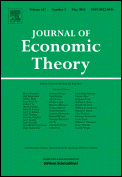
JOURNAL OF ECONOMIC THEORY
Advancing the Frontiers of Economic ThoughtThe JOURNAL OF ECONOMIC THEORY, published by Academic Press Inc Elsevier Science, stands as a paramount platform for disseminating groundbreaking research within the field of economics and econometrics. With an impressive history dating back to 1969 and a convergence period extending to 2024, this journal has continually shaped the academic discourse around critical economic theories and methodologies. Currently recognized in the top quartile (Q1) of its category for 2023, it ranks prominently among its peers, boasting an impactful scholarly contribution reflected in its Scopus ranking—positioned at #348 out of 716 journals in the domain. Although it does not offer Open Access, the journal provides an essential resource for those seeking to enhance their understanding of complex economic models and strategies. Researchers, professionals, and students alike will find the JOURNAL OF ECONOMIC THEORY to be an invaluable asset for their academic and professional pursuits in the rapidly evolving landscape of economics.
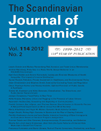
SCANDINAVIAN JOURNAL OF ECONOMICS
Exploring the Frontiers of EconometricsSCANDINAVIAN JOURNAL OF ECONOMICS (ISSN: 0347-0520, E-ISSN: 1467-9442), published by Wiley, stands as a pivotal platform for disseminating research in the fields of economics and econometrics. With an impressive Q1 ranking in both disciplines, this journal plays a critical role in advancing theoretical and applied economic research, catering to an international audience of scholars, practitioners, and students. Its coverage from 1977 to 2024 demonstrates a robust commitment to publishing high-quality research that influences both policy-making and academic inquiry. Although it operates on a traditional subscription model, the journal remains accessible to a broad readership, which is essential for fostering knowledge sharing within the economics community. As such, the SCANDINAVIAN JOURNAL OF ECONOMICS is an essential resource for those seeking to explore the latest developments and methodologies in economic research, helping to bridge practical insights with academic rigor.

Theoretical Economics
Leading the Charge in Theoretical Economic ScholarshipTheoretical Economics, published by the Econometric Society, is a premier open-access journal dedicated to advancing the field of economics through rigorous theoretical analysis. With an ISSN of 1933-6837 and an E-ISSN of 1555-7561, this journal has been at the forefront of economic scholarship since its inception. Operating out of New York University, it holds a prestigious Q1 ranking in the category of Economics, Econometrics, and Finance, reflecting its influential contributions to the discipline. By making research freely accessible since 2006, Theoretical Economics not only fosters a broader dissemination of knowledge but also promotes collaborative dialogue among economists worldwide. The journal's convergence years span from 2007 to 2024, ensuring ongoing relevance in a rapidly evolving field. Researchers, professionals, and students alike will find Theoretical Economics an essential resource for staying informed about cutting-edge theoretical advancements in economics.
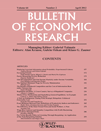
BULLETIN OF ECONOMIC RESEARCH
Elevating the Discourse in Economics Since 1948BULLETIN OF ECONOMIC RESEARCH is a premier academic journal published by WILEY, dedicated to the dissemination of high-quality research in the field of economics and econometrics. Established in 1948, the journal has a rich history of contributing to the scholarly dialogue surrounding economic theory and practice, making it an essential resource for researchers, professionals, and students alike. With an impressive impact factor and ranked in the Q3 category for 2023, the journal publishes original research articles, reviews, and theoretical discussions that reflect current trends and developments in the field. Despite not being an open-access journal, it offers numerous access options through institutional subscriptions, ensuring wide dissemination of its impactful content. Aiming to foster a deeper understanding of economic issues, the BULLETIN OF ECONOMIC RESEARCH serves as a vital platform for ongoing scholarly debate and innovation in economic thought.
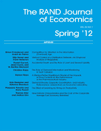
RAND JOURNAL OF ECONOMICS
Advancing Economic Understanding Through Rigorous AnalysisRAND JOURNAL OF ECONOMICS, published by Wiley, is a prestigious peer-reviewed journal that has been a cornerstone in the field of economics since its inception in 1984. With a focus on empirical and theoretical research, it aims to bridge the gap between economic theory and real-world application, providing insights that are both rigorous and relevant. The journal holds an impressive Q1 ranking in Economics and Econometrics, reflecting its significant impact and influence in the field, evidenced by its Scopus rank of #199 out of 716 in related categories. Although it does not offer open access, the journal remains accessible to a broad audience through institutional subscriptions. Researchers, professionals, and students will find RAND JOURNAL OF ECONOMICS an invaluable resource for cutting-edge economic analyses and a vital platform for scholarly dialogue about contemporary economic issues.
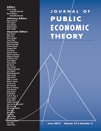
Journal of Public Economic Theory
Advancing Knowledge in Public Economic TheoryJournal of Public Economic Theory, published by WILEY, is an esteemed journal that focuses on the rigorous analysis and exploration of the theories and applications of public economics. With an ISSN of 1097-3923 and E-ISSN 1467-9779, this journal serves as a pivotal platform for researchers, professionals, and students engaged in economics, finance, sociology, and political science. Ranking in the prestigious Q1 and Q2 quartiles across various categories, including Economics and Econometrics as well as Sociology and Political Science, the journal is recognized for its significant contribution to the field. Its broad scope encompasses critical issues related to public policy, welfare economics, and fiscal policy, catering to an international audience. While the journal is not open access, its articles undergo a stringent peer-review process to ensure high-quality research dissemination. With a commitment to fostering scholarly dialogue and understanding, the Journal of Public Economic Theory remains an essential resource for those seeking to delve into the complexities of public economic issues, with a historical record of publication from 1999 to 2024.

ECONOMETRICA
Advancing the frontiers of economic thought.ECONOMETRICA, published by Wiley, is a leading journal in the field of economics and econometrics, renowned for its rigorous and cutting-edge research contributions. With an ISSN of 0012-9682 and an E-ISSN of 1468-0262, this esteemed journal holds a prestigious position in the academic landscape, classified in the top quartile (Q1) for both Economics and Econometrics as of 2023, and ranked 42 out of 716 in its field, placing it in the 94th percentile according to Scopus metrics. The journal's scope encompasses a diverse range of topics aimed at advancing economic theory and its practical applications, making it an essential resource for scholars, practitioners, and students alike. Although it operates under a subscription model, the depth and quality of research published in ECONOMETRICA underscore its significance as a cornerstone for intellectual discourse and innovation within the field. Based in the United Kingdom, at 111 River St, Hoboken, NJ 07030-5774, ECONOMETRICA continues to attract high-caliber contributions that shape the future of econometric research.
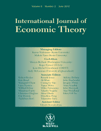
International Journal of Economic Theory
Empowering researchers to shape the future of economics.International Journal of Economic Theory, published by Wiley, serves as a vital platform for scholars and researchers in the fields of economics and econometrics. With its ISSN 1742-7355 and E-ISSN 1742-7363, this journal focuses on advancing theoretical understandings in economics, providing a comprehensive analysis of contemporary economic issues. The journal has been converging knowledge and innovation since its inception in 2009 and continues to sustain a commitment to high-quality research until 2024. As a Q3 journal in the 2023 category rankings, it ranks in the 21st percentile in Scopus for Economics and Econometrics, reflecting its established presence amidst competitive scholarly discourse. Although it is not open access, the journal is widely accessible through institutional subscriptions, facilitating learning and research for professionals, graduate students, and academic leaders. The International Journal of Economic Theory is pivotal for those looking to contribute to economic thought, ensuring that emerging theories find a respected outlet in the global academic landscape.